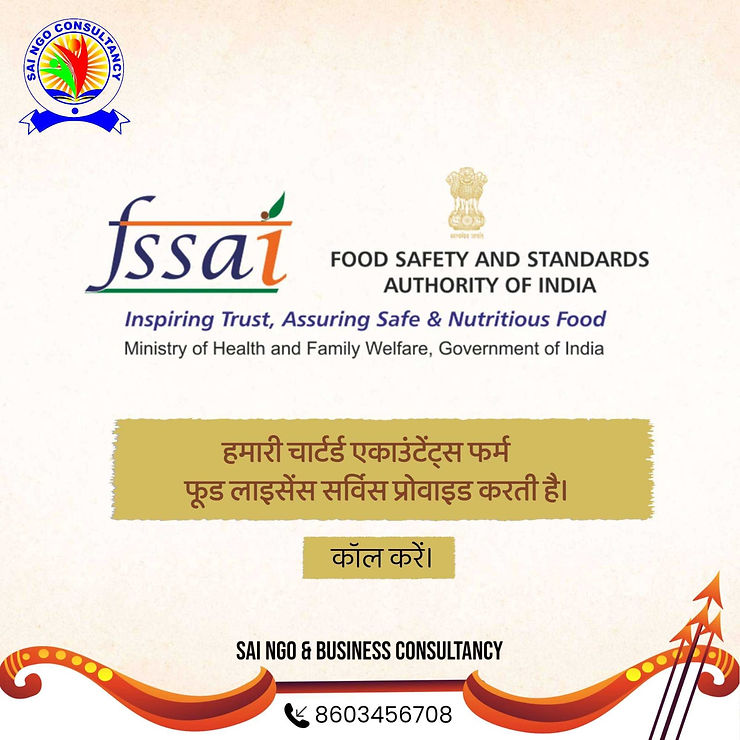WHAT IS FSSAI REGISTRATION? DO YOU KNOW HOW IT IS DONE AND WHAT ARE ITS ADVANTAGE?.
FSSAI registration is a process of obtaining a unique 14-digit registration or license number from the FSSAI, which certifies that the food business operator (FBO) has complied with the food safety standards and regulations set by the FSSAI. The FSSAI registration or license is required for all types of food businesses, ranging from small street vendors to large food manufacturers and exporters.

The process of obtaining FSSAI registration involves the following steps:
1. Determine the type of registration or license required: The FSSAI has categorized food businesses into three categories, based on their turnover and the scale of operation: (i) FSSAI registration for small food businesses with an annual turnover of up to Rs. 12 lakhs, (ii) FSSAI state license for medium-sized food businesses with an annual turnover of more than Rs. 12 lakhs but less than Rs. 20 crores, and (iii) FSSAI central license for large food businesses with an annual turnover of more than Rs. 20 crores.
2. Prepare the required documents: The FBO needs to prepare the necessary documents, including identity proof, address proof, and business registration proof, along with the completed FSSAI application form.
3. Submit the application: The application for FSSAI registration can be submitted online through the FSSAI website or offline at the nearest FSSAI office. The FBO needs to provide all the necessary details and documents, along with the application fee.
4. Verification and inspection: Once the application is submitted, the FSSAI will verify the details and documents provided by the FBO. In some cases, the FSSAI may conduct a physical inspection of the premises to ensure compliance with the food safety standards and regulations.
5. Issuance of registration or license: Upon successful verification and inspection, the FSSAI will issue the registration or license to the FBO, which will be valid for a period of 1-5 years, depending on the type of registration or license obtained.

1. Legal compliance: FSSAI registration is mandatory under the Food Safety and Standards Act, 2006, for all food businesses in India. Obtaining FSSAI registration ensures legal compliance and helps to avoid penalties and fines.
2. Trust and credibility: FSSAI registration or license is a mark of trust and credibility for the food business. It assures the customers that the food products sold by the business comply with the food safety standards and regulations.
3. Access to new markets: FSSAI registration or license is required for the export of food products. Obtaining FSSAI registration enables the food business to access new markets and expand its customer base.
4. Quality control: FSSAI registration or license requires the food business to comply with the food safety standards and regulations set by the FSSAI. This helps to ensure quality control and prevents the sale of substandard or adulterated food products.
5. Brand value: FSSAI registration or license is a mark of quality and compliance. It adds value to the brand and helps to build a positive image in the market.
In conclusion, FSSAI registration is a mandatory requirement for all food businesses in India, and it offers several advantages, including legal compliance, trust and credibility, access to new markets, quality control, and brand value.
FAQS
Here are some frequently asked questions related to FSSAI registration:
1. What is FSSAI registration?
ANS) FSSAI registration is a mandatory requirement for all food businesses in India, as per the Food Safety and Standards Act, 2006. It is a process by which food businesses obtain a unique FSSAI registration or license number, which indicates that the business is complying with the food safety guidelines and regulations.
2. Who needs to obtain FSSAI registration?
ANS)All food businesses in India, including manufacturers, processors, packers, transporters, distributors, and retailers, need to obtain FSSAI registration. Even small food businesses, such as home-based food operators, need to obtain FSSAI registration.
3. What are the different types of FSSAI registration?
ANS)There are three types of FSSAI registration, based on the annual turnover of the food business:
· FSSAI Registration: For food businesses with an annual turnover of up to Rs. 12 lakhs.
· State FSSAI License: For food businesses with an annual turnover of more than Rs. 12 lakhs and up to Rs. 20 crores.
· Central FSSAI License: For food businesses with an annual turnover of more than Rs. 20 crores.
4. What are the documents required for FSSAI registration?
ANS)The documents required for FSSAI registration may vary depending on the type of food business and the category of FSSAI registration. However, some common documents required for FSSAI registration are:
· PAN Card
· Aadhaar Card
· Food safety management plan
· Proof of address of the food business
· Copy of the electricity bill or water bill
· List of food products to be manufactured or processed
· List of machinery and equipment to be used
5. What are the benefits of obtaining FSSAI registration?
ANS) Some benefits of obtaining FSSAI registration are:
· Ensuring the safety and quality of food products
· Building trust and confidence among customers
· Meeting legal and regulatory requirements
· Avoiding penalties and fines
· Enhancing marketability and competitiveness
· Access to government schemes and programs
6. Is FSSAI registration mandatory for e-commerce food businesses?
ANS) Yes, FSSAI registration is mandatory for all e-commerce food businesses, including online food delivery platforms, as per the Food Safety and Standards (Licensing and Registration of Food Businesses) Regulations, 2011.
7. How long is the FSSAI registration valid?
ANS)The validity of FSSAI registration depends on the category of FSSAI registration. FSSAI registration is valid for 1-5 years, while State and Central FSSAI licenses are valid for up to 5 years. After the validity period, the FSSAI registration or license needs to be renewed.
8. What is the process of FSSAI registration?
ANS)The process of FSSAI registration involves the following steps:
· Submitting the FSSAI registration application online or offline, along with the required documents and fees
· Inspection of the food business premises by the Food Safety Officer (FSO)
· Grant of FSSAI registration or license by the FSSAI authority, if the food business complies with the food safety guidelines and regulations
9. What is the penalty for not obtaining FSSAI registration?
ANS)The penalty for not obtaining FSSAI registration is a fine of up to Rs. 5 lakhs or imprisonment of up to 6 months, or both, as per the Food Safety and Standards Act, 2006.


Comments
Post a Comment